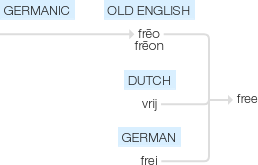Free
Old English frēo (adjective), frēon (verb), of Germanic origin; related to Dutch vrij and German frei, from an Indo-European root meaning ‘to love’, shared by friend.
wiktionary
From Middle English free, fre, freo, from Old English frēo(“free”), from Proto-West Germanic *frī, from Proto-Germanic *frijaz(“beloved, not in bondage”), from Proto-Indo-European *priHós(“dear, beloved”), from *preyH-(“to love, please”). Related to friend. Cognate with West Frisian frij(“free”), Dutch vrij(“free”), Low German free(“free”), German frei(“free”), Danish, Swedish and Norwegian fri(“free”), Sanskrit प्रिय(priyá).
Germanic and Celtic are the only Indo-European language branches in which the PIE word with the meaning of "dear, beloved" acquired the additional meaning of "free" in the sense of "not in bondage". This was an extension of the idea of "characteristic of those who are dear and beloved", in other words friends and tribe members (in contrast to unfree inhabitants from other tribes and prisoners of war, many of which were among the slaves – compare the Latin use of liberi to mean both "free persons" and "children of a family"). [1] [2]
The verb comes from Middle English freen, freoȝen, from Old English frēon, frēoġan(“to free; make free”), from Proto-West Germanic *frijōn, from Proto-Germanic *frijōną, from Proto-Indo-European *preyH-.
etymonline
free (adj.)
Old English freo "exempt from; not in bondage, acting of one's own will," also "noble; joyful," from Proto-Germanic *friaz "beloved; not in bondage" (source also of Old Frisian fri, Old Saxon vri, Old High German vri, German frei, Dutch vrij, Gothic freis "free"), from PIE *priy-a- "dear, beloved," from root *pri- "to love."
The sense evolution from "to love" to "free" is perhaps from the terms "beloved" or "friend" being applied to the free members of one's clan (as opposed to slaves; compare Latin liberi, meaning both "free persons" and "children of a family"). For the older sense in Germanic, compare Gothic frijon "to love;" Old English freod "affection, friendship, peace," friga "love," friðu "peace;" Old Norse friðr "peace, personal security; love, friendship," German Friede "peace;" Old English freo "wife;" Old Norse Frigg, name of the wife of Odin, literally "beloved" or "loving;" Middle Low German vrien "to take to wife," Dutch vrijen, German freien "to woo."
Meaning "clear of obstruction" is from mid-13c.; sense of "unrestrained in movement" is from c. 1300; of animals, "loose, at liberty, wild," late 14c. Meaning "liberal, not parsimonious" is from c. 1300. Sense of "characterized by liberty of action or expression" is from 1630s; of art, etc., "not holding strictly to rule or form," from 1813. Of nations, "not subject to foreign rule or to despotism," recorded in English from late 14c. (Free world "non-communist nations" attested from 1950 on notion of "based on principles of civil liberty.") Sense of "given without cost" is 1580s, from notion of "free of cost."
Free even to the definition of freedom, "without any hindrance that does not arise out of his own constitution." [Emerson, "The American Scholar," 1837]
Free lunch, originally offered in bars to draw in customers, by 1850, American English. Free pass on railways, etc., attested by 1850. Free speech in Britain was used of a privilege in Parliament since the time of Henry VIII. In U.S., in reference to a civil right to expression, it became a prominent phrase in the debates over the Gag Rule (1836). Free enterprise recorded from 1832; free trade is from 1823; free market from 1630s. Free will is from early 13c. Free school is from late 15c. Free association in psychology is from 1899. Free love "sexual liberation" attested from 1822 (the doctrine itself is much older), American English. Free and easy "unrestrained" is from 1690s.
free (v.)
Old English freogan "to free, liberate, manumit," also "to love, think of lovingly, honor;" also "to rid (of something)," from freo "not in bondage" (see free (adj.)). The forking sense in the Germanic adjective is reflected in the verbs that grew from it in the daughter languages. Compare Old Frisian fria "to make free;" Old Saxon friohan "to court, woo;" German befreien "to free," freien "to woo;" Old Norse frja "to love;" Gothic frijon "to love." Related: Freed; freeing.
